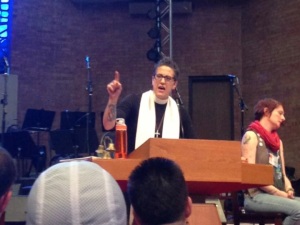“Water Into Wine”
Isaiah 43:1-7, John 2:1-11, and John 1:29-34
January 13, 2012
First Presbyterian Church of Jesup
 Have you ever read the Bible and felt like this? Like you’re being pointed in all sorts of directions and you’re not sure where to go? Or maybe you felt that it might mean something for your life, but your not sure which? And when you read more about scripture it you might hear even more of a confusing message?
Have you ever read the Bible and felt like this? Like you’re being pointed in all sorts of directions and you’re not sure where to go? Or maybe you felt that it might mean something for your life, but your not sure which? And when you read more about scripture it you might hear even more of a confusing message?
Signs are really only helpful if we’re able to read them, and able to understand what the mean, and what we’re supposed to do in response.
This is also true when it comes to Jesus’ actions in the gospels. His miracles, including this one in Cana, are called “signs.” A sign points to something beyond itself. There needs to be a certain sort of understanding to be able to interpret a sign.
The thing about a sign is that it points to something beyond itself. If you’re driving along and you see this sign you know that this line with the triangle at the end means that the road is curving right.
 If you see this one, you know there’s construction up ahead and you know to watch out for workers in the road.
If you see this one, you know there’s construction up ahead and you know to watch out for workers in the road.
When Jesus does a miracle, more is going on that just what we can take in at first glance. Which is important to know, especially when we see a sign like his miracle in Cana. In a first read through it seems like all Jesus is doing is making some people happy at a party. The signs of Jesus tell us about who Jesus is, His mission on earth, and the new age He brings about by his coming.  The signs of Jesus are truly “significant.” They point to who Jesus is and what he came to do. So, let’s unpack this story a bit and figure out what making wine at a party has to do with the mission of Jesus Christ and what it has to do with us.
The signs of Jesus are truly “significant.” They point to who Jesus is and what he came to do. So, let’s unpack this story a bit and figure out what making wine at a party has to do with the mission of Jesus Christ and what it has to do with us.
 When we first start out this story it’s a bit strange: when told by his mother, Mary, that there was no wine his initial response is “what concern is that to you and to me? My hour has not yet come.”
When we first start out this story it’s a bit strange: when told by his mother, Mary, that there was no wine his initial response is “what concern is that to you and to me? My hour has not yet come.”
Any parent or teacher who has asked a child to do a chore, go to sleep at bedtime, or learn a math problem might hear a familiar voice here: “Why me?” “Why should I care about this?” “Can’t I do it later?” “Ten more minutes?” When we know that this is Jesus’ very first miracle, it’s a strange thing to hear that he seemed reluctant, and even a bit petulant at his mother’s request.
Mary’s appeal brings images of a proud mother. She had confidence that in this situation Jesus could do something to turn it around. But really, making wine at a party? This is Jesus’s first act of ministry? This is what gets the ball rolling on a career as savior of the world? Winemaking?
 However, when we look at this one strange seeming inconsequential act in the scope of Jesus’ entire ministry, it makes a great deal of sense. Jesus is the bringer of living water and that water is transformed by His death, which we remember by sharing in the wine of communion. This one act, at the beginning of His ministry provides bookends to his life’s ministry. Christ gives living water and is transformed into wine.
However, when we look at this one strange seeming inconsequential act in the scope of Jesus’ entire ministry, it makes a great deal of sense. Jesus is the bringer of living water and that water is transformed by His death, which we remember by sharing in the wine of communion. This one act, at the beginning of His ministry provides bookends to his life’s ministry. Christ gives living water and is transformed into wine.
 Scripture is filled with imagery of water as challenging, saving, confronting, and life giving. As our students learned in WOW this past Fall, water is woven throughout the Moses narrative: carrying Moses to a new life, saving the Israelites from the Egyptians at the Red Sea, and flowing from a rock as a sign of God’s provision to the Israelites in the wilderness.
Scripture is filled with imagery of water as challenging, saving, confronting, and life giving. As our students learned in WOW this past Fall, water is woven throughout the Moses narrative: carrying Moses to a new life, saving the Israelites from the Egyptians at the Red Sea, and flowing from a rock as a sign of God’s provision to the Israelites in the wilderness.
In our Old Testament passage today we hear the claim God places on us, which we commemorate in baptism: “I have called you by name, you are mine. When you pass through the waters, I will be with you; and through the rivers, they shall not overwhelm you.”
 In John 1:29-34 we hear of Jesus’ baptism: “[John] saw Jesus coming toward him and declared, “Here is the Lamb of God who takes away the sin of the world! This is he of whom I said, ‘After me comes a man who ranks ahead of me because he was before me.’ I myself did not know him; but I came baptizing with water for this reason, that he might be revealed to Israel.” And John testified, “I saw the Spirit descending from heaven like a dove, and it remained on him. I myself did not know him, but the one who sent me to baptize with water said to me, ‘He on whom you see the Spirit descend and remain is the one who baptizes with the Holy Spirit.’ And I myself have seen and have testified that this is the Son of God.”
In John 1:29-34 we hear of Jesus’ baptism: “[John] saw Jesus coming toward him and declared, “Here is the Lamb of God who takes away the sin of the world! This is he of whom I said, ‘After me comes a man who ranks ahead of me because he was before me.’ I myself did not know him; but I came baptizing with water for this reason, that he might be revealed to Israel.” And John testified, “I saw the Spirit descending from heaven like a dove, and it remained on him. I myself did not know him, but the one who sent me to baptize with water said to me, ‘He on whom you see the Spirit descend and remain is the one who baptizes with the Holy Spirit.’ And I myself have seen and have testified that this is the Son of God.”
 This passage of Christ’s baptism comes right before the story of his first miracle. This is no accident. When Christ is turning water into wine, He Himself has already taken his place as the living water. In His baptism the Holy Spirit descends upon Him. In Matthew’s account of Jesus’ baptism it says that, God’s voice was heard saying, “This is my Son, the Beloved, with whom I am well pleased.”[1] Though always connected, the trinity, Father, Son, and Holy Spirit are all cited a specifically present during Christ’s baptism. Though Jesus was claiming God as father as early as when he was twelve in the temple, this claim by God that Jesus is God’s own son was the first public action by God that set Jesus apart as God’s son. And in this ministry Jesus does not go it alone, but goes in the company of the Holy Spirit, who is in and through all things.
This passage of Christ’s baptism comes right before the story of his first miracle. This is no accident. When Christ is turning water into wine, He Himself has already taken his place as the living water. In His baptism the Holy Spirit descends upon Him. In Matthew’s account of Jesus’ baptism it says that, God’s voice was heard saying, “This is my Son, the Beloved, with whom I am well pleased.”[1] Though always connected, the trinity, Father, Son, and Holy Spirit are all cited a specifically present during Christ’s baptism. Though Jesus was claiming God as father as early as when he was twelve in the temple, this claim by God that Jesus is God’s own son was the first public action by God that set Jesus apart as God’s son. And in this ministry Jesus does not go it alone, but goes in the company of the Holy Spirit, who is in and through all things.
On Christmas we celebrated Jesus’ birth, last week on Epiphany Sunday we celebrated Christ’s manifestation. These two scriptures Jesus’ baptism and Jesus’ miracle at Cana, bring us to the beginning of Jesus’ ministry. A time when the living water came to life, living a ministry that would give live to all people.
 Though this first miracle happens in the context of a party, this transformation from water into wine points to a future much more bitter than that of living water. Christ did not come simply to wash the world clean, but to transform the world through His life.
Though this first miracle happens in the context of a party, this transformation from water into wine points to a future much more bitter than that of living water. Christ did not come simply to wash the world clean, but to transform the world through His life.
Though we use grape juice in our communion as we remember Jesus, there are reasons why Jesus’s death is remembered through wine and not grape juice. Sure there’s the cultural context of a community of disciples that would’ve been more likely to dine with wine than with water, but there are also chemical reasons. While both are bitter and sweet, wine can be abused. Wine can lift the spirits, but too much can cause personal harm and ruin relationships. Wine is in remembrance of Jesus’ death, in remembrance of the pain of crucifixion, and the horrors of Christ’s descent into Hell. We sample just a taste of this bitterness in communion, but we are not meant to intoxicate ourselves with the grief of Christ’s death.
 This is not to say that we are powerless in this transformation as Christ moves the world from living water to eternal life giving wine. We have a role in bringing about the Kingdom of God, a role demonstrated by Mary in this story. Jesus is reluctant, but Mary prods Jesus towards this new ministry. Divine action and human initiative are linked. God does not need us to point to what is wrong with the world, but when we pray we are lifting up the concerns of God, making them manifest in our own lives, and we await an answer. We open ourselves to God’s action in the world. When we hear “my time has not yet come,” we are frustrated, we are annoyed, but we are also attentive to what will come next Mary, mother of Jesus, gives us an example of her own prodding at God, but also an example of how God’s will is to be enacted. “They have no wine,” Mary says. Jesus replies, “my time has not yet come.” She does not say, “ oh yes it does!” She does not rail against her literally holier than thou son, but she leaves space for divinity to be enacted, instructing the servants of the house, “do whatever He asks of you.”
This is not to say that we are powerless in this transformation as Christ moves the world from living water to eternal life giving wine. We have a role in bringing about the Kingdom of God, a role demonstrated by Mary in this story. Jesus is reluctant, but Mary prods Jesus towards this new ministry. Divine action and human initiative are linked. God does not need us to point to what is wrong with the world, but when we pray we are lifting up the concerns of God, making them manifest in our own lives, and we await an answer. We open ourselves to God’s action in the world. When we hear “my time has not yet come,” we are frustrated, we are annoyed, but we are also attentive to what will come next Mary, mother of Jesus, gives us an example of her own prodding at God, but also an example of how God’s will is to be enacted. “They have no wine,” Mary says. Jesus replies, “my time has not yet come.” She does not say, “ oh yes it does!” She does not rail against her literally holier than thou son, but she leaves space for divinity to be enacted, instructing the servants of the house, “do whatever He asks of you.”
 Here is the blueprint to divine transformation: When God’s concerns become our own, and we lift them up to God, faithful obedience leads to the transformation of our hearts and the world. God’s will can be enacted through us, but only if we are open to be changed by asking for that change, and discovering our role in transforming God’s Kingdom.
Here is the blueprint to divine transformation: When God’s concerns become our own, and we lift them up to God, faithful obedience leads to the transformation of our hearts and the world. God’s will can be enacted through us, but only if we are open to be changed by asking for that change, and discovering our role in transforming God’s Kingdom.
In our baptism Christ claims us as His own, as children of the Kingdom of God. We drink of the living water. We are cleansed of our sins and given new life. In Christ’s death Christ claims our sins as His own, giving us the ability to live eternally in God’s Kingdom and God’s grace. The good news is as Jesus transforms water into wine, Christ also transforms our lives through claiming us in baptism and redeeming us through his crucifixion.
 This is a message of hope that poet, Tom Lane writes of this in his poem, “If Jesus Could”: If Jesus could transform common water into wedding wine spit and dirt into new sight troubled sea into a pathway well water into living water Could Christ transform the waters of my life? shallow murky polluted stagnant sour into a shower of blessing?
This is a message of hope that poet, Tom Lane writes of this in his poem, “If Jesus Could”: If Jesus could transform common water into wedding wine spit and dirt into new sight troubled sea into a pathway well water into living water Could Christ transform the waters of my life? shallow murky polluted stagnant sour into a shower of blessing?
May we be open to Christ’s transforming power in our lives and in this world, and open to how God is calling us to help transform the world for His kingdom. Amen.
 Today is recognized in the Presbyterian Church as Disability Inclusion Sunday. While I hope every single Sunday is a day of inclusion for all people, I do think this scheduling gives us the opportunity to highlight the importance of people of all very abilities as members of the household of God, with gifts that contribute to the building up of the entire church.
Today is recognized in the Presbyterian Church as Disability Inclusion Sunday. While I hope every single Sunday is a day of inclusion for all people, I do think this scheduling gives us the opportunity to highlight the importance of people of all very abilities as members of the household of God, with gifts that contribute to the building up of the entire church. While I was at the Festival of Homiletics (Preaching) a few weeks ago I heard a very compelling sermon by Nadia Bolz-Weber examining issues of disability. She’s a Lutheran pastor who leads a congregation called “A House For All Sinners and Saints,” a very non traditional sort of church that uses very traditional liturgy in Denver, CO. In her sermon in Nashville she framed disability and ability in a way I had never quite thought of before.
While I was at the Festival of Homiletics (Preaching) a few weeks ago I heard a very compelling sermon by Nadia Bolz-Weber examining issues of disability. She’s a Lutheran pastor who leads a congregation called “A House For All Sinners and Saints,” a very non traditional sort of church that uses very traditional liturgy in Denver, CO. In her sermon in Nashville she framed disability and ability in a way I had never quite thought of before. Nadia then spoke of famous Evangelical Christian, Joni Eareckson, who Nadia describes as a hero of hers. As a teenager Joni became a quadriplegic from a diving accident and wrote a memoir about her story and relationship with God.
Nadia then spoke of famous Evangelical Christian, Joni Eareckson, who Nadia describes as a hero of hers. As a teenager Joni became a quadriplegic from a diving accident and wrote a memoir about her story and relationship with God.  Having lost the use of her arms she eventually learned to paint by holding a brush in her teeth. Nadia was watching 24 consecutive hours of Christian television for a project she was doing and saw Joni on the 700 Club. Here’s what Nadia said about this interview:
Having lost the use of her arms she eventually learned to paint by holding a brush in her teeth. Nadia was watching 24 consecutive hours of Christian television for a project she was doing and saw Joni on the 700 Club. Here’s what Nadia said about this interview: Have you ever read the Bible and felt like this? Like you’re being pointed in all sorts of directions and you’re not sure where to go? Or maybe you felt that it might mean something for your life, but your not sure which? And when you read more about scripture it you might hear even more of a confusing message?
Have you ever read the Bible and felt like this? Like you’re being pointed in all sorts of directions and you’re not sure where to go? Or maybe you felt that it might mean something for your life, but your not sure which? And when you read more about scripture it you might hear even more of a confusing message?










